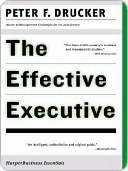More on this book
Community
Kindle Notes & Highlights
Working on the right things is what makes knowledge work effective.
They are changes in the trends.
Such changes, however, have to be perceived; they
They have to be acquired, as we all learn the multiplication
Practices one learns by practicing and practicing and
practicing again.
Wherever knowledge workers perform well in large organizations, senior executives take time out, on a regular schedule, to sit down with them, sometimes all the way down to green juniors, and ask: “What should we at the head of this organization know about your work?
that a high standard of living presupposes an economy of innovation and change. But innovation and change make inordinate time demands on the executive.
the record is made in “real” time, that is at the time of the event itself, rather than later on from memory.
But the man who focuses on contribution and who takes responsibility for results, no matter how junior, is in the most literal sense of the phrase, “top management.” He holds himself accountable for the performance of the whole.
“What can I contribute?” is to
look for the unused potential in the job. And what
An executive’s focus on contribution by itself is a powerful force in developing people. People adjust to the level of the demands made on them. The executive who sets his sights on contribution, raises the sights and standards of everyone with whom he works.
“What can I and no one else do which, if done really well, would make a real difference to this company?” The one, truly significant contribution, he concluded, would be the development of tomorrow’s managers.
a man wants to be an executive—that is, if he wants to be considered responsible for his contribution—he has to concern himself with the usability of his “product”—that is, his knowledge.
Effective executives find themselves asking
“What contribution from me do you require to make your contribution to the organization? When do you need this, how do you need it, and in what form?”
The only meaningful definition of a “generalist” is a specialist who can relate his own small area to the universe of knowledge.
four basic requirements of effective human relations:
communications; teamwork; self-development; and development
of ot...
This highlight has been truncated due to consecutive passage length restrictions.
One finds out which hypotheses are tenable, and therefore worthy of serious consideration, and which are eliminated by the first test against observable experience.
The effective executive encourages opinions.
And he makes it a habit—in himself and in the people with whom he works—to think through and spell out what needs to be looked at, studied, and tested. He
Whenever one analyzes the way a truly effective, a
truly right, decision has been
one finds that a great deal of work and thought went into finding the ap...
This highlight has been truncated due to consecutive passage length restrictions.
The first rule in decision-making is that one does not make a decision unless there is disagreement.
The effective decision-maker, therefore, organizes disagreement.
Disagreement converts the plausible into the right and the right into the good decision.
He starts out with the commitment to find out why
people disagree.
the effective decision-maker asks: “Is a decision really necessary?” One alternative is always the alternative of doing nothing.
Effectiveness must be learned.


